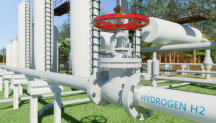

-
-
IRENA AND METHANOL INSTITUTE (2021), Innovation Outlook : Renewable Methanol, International Renewable Energy Agency, Abu Dhabi.
Copied
/-/media/Files/IRENA/Agency/Publication/2021/Jan/IRENA_Innovation_Renewable_Methanol_2021.pdf?rev=ca7ec52e824041e8b20407ab2e6c7341
Copied
Innovation Outlook: Renewable Methanol
Newsletter
Methanol is essential for the chemical industry and represents an emerging fuel for a wide range of uses. Although largely produced from fossil fuels, it can also be made from sustainable, renewable-based energy sources.
The report is also available in Chinese (中文)
The need to mitigate climate change and eliminate carbon dioxide (CO2) emissions from all kinds of energy use has prompted rising global interest in renewable methanol. The shift to such types – derived from biomass or synthesised from green (renewable-based) hydrogen and CO2 – could expand methanol's use as a chemical feedstock and help to make industry and transport fuels carbon neutral.
Costs for renewable methanol are currently high, while production volumes are low. But with the right policies, renewable methanol could become cost competitive by 2050 or earlier.
This outlook from the International Renewable Energy Agency (IRENA) and the Methanol Institute identifies challenges, offers policy recommendations and explores ways to produce renewable methanol at a reasonable cost.
Chemical and plastic industries – which currently use about two-thirds of all methanol – particularly need this to cut their process emissions.
Key recommendations:
- Ensure systemic investment throughout the value chain, including technology development, infrastructure and deployment.
- Support market forces in the chemical sector, focusing on carbon intensity in consumer products.
- Acknowledge how renewable methanol can contribute to carbon neutrality in "green deals", COVID-19 economic recovery packages and hydrogen strategies.
- Translate the political will for carbon reduction into regulatory measures and support.
- Level the playing field for renewable methanol through public policy, including electrification and sector coupling measures, which would integrate renewable power supply with fuel demand throughout the economy.
- Encourage international co-operation on trade strategies to create jobs and foster competitive new "e-methanol" industries in both producing and consuming regions.
IRENA's Innovation Outlook series analyses rapidly emerging renewable energy technologies (RETs) and examines ways to enhance their competitiveness. Each outlook identifies technology-, industry- and policy-related challenges and assesses the potential breakthroughs needed to accelerate the uptake.
Others in the series include:




